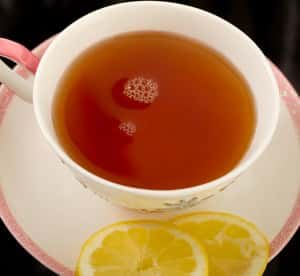
Research in mice hints that tea drinkers might find it easier to lose weight than those choosing other beverages. Green tea has a reputation as aiding in weight loss (Turkozu & Tek, Critical Reviews in Food Science and Nutrition, Jan. 22, 2017). But a new study suggests that black tea might also prove useful.
How Would Tea Drinkers Keep from Gaining Weight?
The scientists knew that decaffeinated polyphenols from both green and black tea would keep mice from gaining weight (Henning et al, European Journal of Nutrition, online Sept 30, 2017). The compounds from green tea are absorbed into the body, but those from black tea are too large to pass through the lining of the small intestine. So how would they work?
Tea Compounds Shape Gut Microbiota:
Mice in the study were assigned to four different diets. All were high in sugar, which promotes weight gain. But one was low in fat and another high in fat. (Presumably, a high-fat, high-sugar diet promotes weight gain in mice as well as in humans.) In addition, a third group of mice got a high-fat, high-sugar diet with green tea extract while a fourth got the same diet, but with black tea extract.
Tea Compounds Blocked Weight Gain:
The mice with either tea extract in their diets gained no more weight than those on the low-fat diet. Analysis of intestinal microbes showed a shift in the balance toward bacteria associated with lean body mass.
While this is a mouse study, human tea drinkers might anticipate similar benefits. Of course, the diet that they follow will also have an impact on weight control (Yang et al, Molecular Nutrition & Food Research, Jan. 2016).
It may be helpful for tea drinkers to be able to choose their favorite beverage, whether it is green or black tea. Drinking it with little or no sugar might be best for avoiding weight gain. An Australian researcher developed a simple brewing technique for maximizing the compounds from green tea. We wrote about it here.

